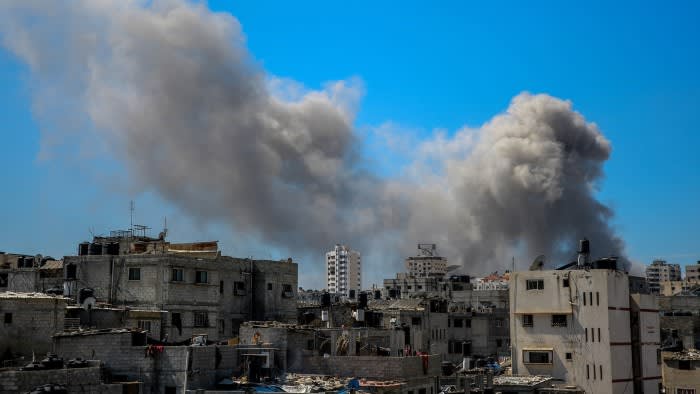Unlock the Editor’s Digest for free
Roula Khalaf, Editor of the FT, selects her favourite stories in this weekly newsletter.
Israel says it has killed 170 people and detained 800 more in an almost week-long clash with Hamas militants at Gaza City’s al-Shifa hospital, one of the biggest battles of the war in the Palestinian enclave.
The Israeli raid on the hospital, once Gaza’s largest health facility, was launched early last week, with a brigade of special forces and tanks swiftly encircling the hospital, according to the Israel Defense Forces.
According to Israeli officials, 170 militants from Hamas and Palestinian Islamic Jihad have been killed while the IDF said 500 militants were among the 800 people detained, including senior field commanders from both armed groups. Weapons and millions of US dollars and Jordanian dinars were also allegedly seized. Three Israeli soldiers have been killed.
Several thousand Palestinians who had sought shelter at al-Shifa were forced to evacuate through a checkpoint to shelters south of the hospital. Patients and medical staff had been moved to a dedicated wing of the sprawling complex as Israeli commandos continued room-to-room searches, with video footage indicating firefights and the use of miniature drones and bulldozers by Israeli forces.
“This is the operation with the largest aggregation of terrorists we have apprehended since the beginning of the war,” said Daniel Hagari, the IDF’s chief spokesman.
Large-scale encounters between the IDF and Palestinian militants have been rare in the five and a half months of conflict since Hamas launched a cross-border raid on Israel on October 7. Unable to match IDF firepower, Hamas fighters have resorted to operating in smaller cells and deploying guerrilla tactics.
Early on Sunday, the IDF also began a new offensive in Khan Younis, southern Gaza’s largest city, against what it described as “terrorist infrastructure . . . and operatives”. The Palestinian Red Crescent Society and local media reports said the city’s al-Nasser and al-Amal hospitals, which the IDF raided last month, were being encircled.
Israel drew widespread international censure during its first operation at al-Shifa in November. Some critics contended that the tunnels underneath the hospital that were destroyed in the first operation did not meet IDF claims of a sprawling command and control centre.
The IDF later withdrew from the majority of northern Gaza, including al-Shifa, and is now conducting targeted raids with smaller forces in the area. One senior Israeli military official claimed the withdrawal was intended to encourage increased activity from Hamas operatives that would make it easier for the IDF to target them.
Yet critics have pointed to the ongoing al-Shifa raid, and the large number of militants still operating in north Gaza, as indications of Hamas’s continued resilience and Israel’s lack of postwar planning.
For many in the international community, the continued targeting of al-Shifa has compounded the misery for the civilian population of Gaza, where more than 32,000 people have been killed, according to health authorities in the Hamas-controlled enclave.
Ismail Haniyeh, the Doha-based Hamas leader, said in a statement last week that “what the Zionist occupation is doing in al-Shifa hospital complex confirms that this enemy is fighting the return of life to the Gaza Strip, and seeks to destroy all components of human life”.
Some 1,200 people were killed during Hamas’s October 7 attack on southern Israel which triggered the war, with more than 130 hostages still being held by the group, according to Israeli figures.
The al-Shifa operation is expected to continue for several days, with a top Israeli general vowing on Friday that it would only be concluded “when the last terrorist is in our hands — alive or dead”.
Philippe Lazzarini, head of the UN agency for Palestinian refugees UNRWA, said on Sunday that Israel had informed the organisation that it would no longer approve its aid deliveries into northern Gaza, which is enduring the worst of the humanitarian crisis in the strip.
“This is outrageous and makes it intentional to obstruct life-saving assistance during a man-made famine,” Lazzarini said in a post on X. “By preventing UNRWA to fulfil its mandate in Gaza, the clock will tick faster towards famine.”
Israel has long sought to close down UNRWA’s operations in Gaza. It alleged in January that 12 of the agency’s employees had taken part in Hamas’s October 7 attack, causing many western donors to suspend funding to the organisation. Israel has provided only limited evidence to support its claims.
In recent weeks, the limited aid reaching northern Gaza has been delivered by what Israel described as “private contractors” or the UN’s World Food Programme, as Israel seeks to circumvent UNRWA.
Visiting the Egyptian-Gaza border crossing at Rafah on Saturday, UN secretary-general António Guterres called the humanitarian crisis in the Palestinian territory a “moral outrage” and demanded Israel provide “ironclad commitments” on increasing the flow of aid, as a long line of relief trucks remained blocked from entry.

Emily Foster is a globe-trotting journalist based in the UK. Her articles offer readers a global perspective on international events, exploring complex geopolitical issues and providing a nuanced view of the world’s most pressing challenges.








